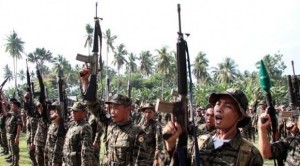
While the decommissioning of the 11,000-strong MILF fighting force and its weapons is the focal point of the normalization annex that completes the peace agreement between the Moro secessionist movement and the government, exactly how many of them will lay down their arms will be known only after the comprehensive agreement on the Bangsamoro is signed. AFP FILE PHOTO
KUALA LUMPUR—The numbers aren’t available yet in the silencing of the guns of the Moro Islamic Liberation Front (MILF).
While the decommissioning of the 11,000-strong MILF fighting force and its weapons is the focal point of the normalization annex that completes the peace agreement between the Moro secessionist movement and the government, exactly how many of them will lay down their arms will be known only after the comprehensive agreement on the Bangsamoro is signed.
“The phasing and sequencing of the different elements of the annex on normalization are reflected in the attached matrix. The matrix shall be released upon the signing of the comprehensive agreement on the Bangsamoro,” the two parties said in the annex.
The 10-page normalization annex is the fourth and final document that completes the peace plan, giving flesh to a comprehensive peace agreement after four decades of fighting in Central Mindanao that has cost the lives of tens of thousands of people.
The annex provides for an independent decommissioning body (IDB), comprised of three foreign and four local experts jointly nominated by the two parties, that will oversee the decommissioning of the MILF arms. A foreign expert will head the body.
The IDB will oversee the overall decommissioning of the MILF’s Bangsamoro Islamic Armed Forces (BIAF), including the inventory and verification of their fighters and weapons. It will plan and implement techniques for weapons collection, transport and storage.
The annex provides for a joint normalization committee, which will oversee the overall normalization process.
MILF camps
Six MILF camps that will be transformed to “peaceful and productive communities” are identified as part of the sociodevelopment aspect of the annex.
The camps include the 12,000-hectare Camp Abubakar al Siddique in Maguindanao province, the main enclave of the MILF that fell in the military’s hands in the all-out war in 2000.
The others are Camp Bilal in Lanao del Norte and Lanao del Sur provinces, Camp Omar ibn-al Khattab in Maguindanao, Camp Rajamuda in North Cotabato and Maguindanao, Camp Badre in Maguindanao and Camp Busrah Somiorang in Lanao del Sur.
“As a gesture of goodwill, the two parties shall constitute joint task forces for the… acknowledged MILF camps. The task forces will assess the needs, plan appropriate programs and undertake the necessary measures to transform these areas into peaceful and productive communities,” the document says.
The annex says the decommissioning is a “process aimed at achieving a smooth transition for the BIAF members to productive civilian life.”
Healing the wounds
The annex also says the government will “take immediate steps through amnesty, pardon and other available processes toward the resolution of cases of persons charged with or convicted of crimes and offenses connected to the armed conflict in Mindanao” as part of the “healing of the wounds of conflict.”
There will be a joint security assessment and an inventory of the Armed Forces of the Philippines troops and units in Bangsamoro for the redeployment of military personnel and to “avoid a security vacuum” in the proposed autonomous region.
“The AFP shall only retain installations necessary for national defense and security,” the annex says.
Aside from the decommissioning of firearms, the annex provides for:
Transitional justice and reconciliation.
Socioeconomic development programs for the strife-torn communities through the Sajahatra Bangsamoro and the establishment of a trust fund for donors who will support the normalization process.
Establishment of a Bangsamoro police force.
Disbandment of private armed groups.
The disbandment of the private armed groups will be “a priority” of both the government and the MILF. Both parties will devise ways of dealing with the private armed groups.
Security
A six-member joint peace and security committee will also be formed to, among other functions, develop guidelines for the joint peace and security teams (JPST) that will be comprised of members of the BIAF, the military and the Philippine National Police.
The JPST will go after the private armed groups.
Private armed groups, maintained by political warlords, pose one of the more difficult challenges to the MILF once the government redeploys its military troops out of the Bangsamoro region, leaving the Bangsamoro autonomous government alone, though with its own police force.